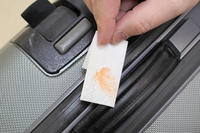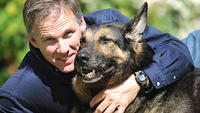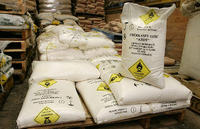-
Valley Forge, Livermore agree on explosive detection patents
Last Thursday Valley Forge Composite Technologies, Inc. announced that it had just reached an agreement with Lawrence Livermore National Laboratory for several key technological advances in hidden explosive detection
-
-
U.S. Army buys Raptor's MIPs-based detectors

Molecularly imprinted polymers (MIPs) technology is capable of selectively sensing microscopic amounts of explosives or other molecules that are dangerous for humans and the environment, such as toxins, chemical agents, biological agents, pesticides, and poisons; the U.S. Army wants more MIPs detectors
-
-
Implant Sciences receives U.S. patent for explosives trace detection technology
Keeping sample tubes used in chemical detection systems clean is important for obtaining accurate analysis results; Implant Sciences receives a U.S. patent for a procedure called Flash Heating for Tubing
-
-
X-ray machine operators lack proper training, says explosives expert

Even with the increasing ubiquity of X-ray machines and other explosives detection devices, many dangerous contraband items are still passing through security checkpoints at government buildings, airports, and businesses as a result of poor training; in 2009 Government Accountability Office (GAO) investigators successfully smuggled bomb making materials into ten high-security federal buildings
-
-
Detroit police disarm IED found in restaurant
On Sunday, an improvised explosive device was found in the restroom of a Detroit restaurant; police confirmed that it was a bomb and successfully disarmed it
-
-
Laser device detects IEDs

Researchers have developed a laser that could detect roadside bombs — the deadliest enemy weapon U.S. and coalition soldiers encountered in Iraq and Afghanistan; the laser, which has comparable output to a simple presentation pointer, potentially has the sensitivity and selectivity to canvas large areas and detect improvised explosive devices
-
-
Children no longer have to remove shoes at airports

DHS Secretary Janet Napolitano said that her agency is changing its airport security policy for children twelve years and younger who will no longer be required to remove their shoes at airport checkpoints; in addition, Napolitano said the agency’s new policies seek to avoid pat downs for children by using other screening techniques
-
-
$1.1 million order for Implant Sciences' portable explosives detectors
Implant Sciences Corporation, a developer of explosives detection technology, recently announced that it had received a $1.1 million order for its portable explosives detection systems; with the latest purchase, Implant Sciences will supply its Quantum Sniffer QS H-150 portable devices to the Middle East for use by critical infrastructure operators
-
-
TSA: Aviation security "stronger and more secure" ten years later
Lisa Farbstein, a spokesperson for the Transportation Security Administration (TSA); discusses new technologies implemented by TSA and DHS and the agency’s shift to a more risk-based approach to passenger screening
-
-
Germany says "nein" to full-body scanners
Germany has decided against deploying full-body scanners at German airports; after a 10-month trial, in which 1,280,000 passengers were scanned, the government said that the false alarm rate was just too high
-
-
Marines deploy bomb-sniffing dog alternative
When bomb-sniffing dogs at Camp Lejeune, the Marine base in North Carolina, are unavailable, military police turn to Fido; the Fido XT Explosives Detector is a handheld device that is capable of sniffing out explosives or residuals in vehicles
-
-
Aussies to clone explosives sniffer dogs

Two Aussie dog-breeding companies will collaborate with South Korean scientists on cloning explosives and drug sniffer dogs; the first batch of ten dogs will go into service in 2013; the Australians cloned dogs would be made from tissue samples taken from a German shepherd called Hassan von Gruntal, who died in 2001; cloned sniffer dogs have already been used in South Korea and the United States
-
-
DHS slow to crack down on ammonium nitrate sales

U.S. lawmakers are becoming frustrated with DHS for its slow implementation of regulations on ammonium nitrate fertilizer, a key ingredient in dangerous homemade explosives like the one used in the deadly 1995 Oklahoma City bombing; Congress initially passed legislation tightening control on the sale of the fertilizer in 2008, but DHS has yet to implement such regulations and three years later is only now publishing a set of “proposed” rule
-
-
New software to improve explosive detection
New software developed by Peaklet Analysis with the aid of a Western Kentucky University (WKU) math professor could help existing explosives detectors improve their detection abilities
-
-
Nano sensor detects minute traces of plastic explosives
Scientists have developed an extremely sensitive explosives sensor that is capable of detecting even slight traces of the high-explosive chemical compound pentaerythritol tetranitrate (PETN); terrorists had employed PETN in several attacks on commercial aircraft
-
More headlines
The long view
Prototype Self-Service Screening System Unveiled
TSA and DHS S&T unveiled a prototype checkpoint technology, the self-service screening system, at Harry Reid International Airport (LAS) in Las Vegas, NV. The aim is to provide a near self-sufficient passenger screening process while enabling passengers to directly receive on-person alarm information and allow for the passenger self-resolution of those alarms.
